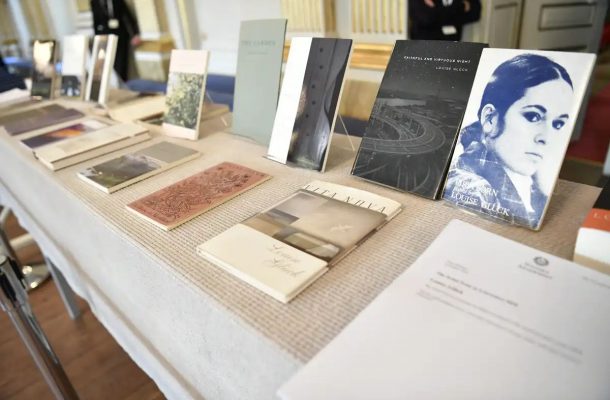Louise Glück wins the Nobel Prize for Literature

Louise Glück is the first poet to win the Nobel Prize in Literature since Tomas Tranströmer in 2011 and the first American to win since Toni Morrison in 1993.
In their preference for the muddiness of everyday life over explicit engagement with their political and social issues, you can see a broad link between Glück and Tranströmer.
On the surface, though, Morrison and Glück couldn’t appear to be more different. Morrison’s work lays bare both the lasting scars and the perennial nature of American trauma, whereas Glück’s work is altogether quieter, more local and apparently lacking that broad, socially and politically engaged canvas.
But look past the surface and there are affinities between the two writers. Since her early poems, Glück has been concerned with charting what it means to live as an individual in America. It is a nuanced, controlled form of lyric poetry that is as interested in what it has not been possible to say as what has been said – and the ways the latter haunts and shapes the former.
“I dislike being herded into certainty”, Glück has written. We live in an age in which certainty is valued above almost anything else. We appear to want, for instance, the certainty of a vaccine against COVID-19, the certainty that the pandemic will be brought to heel, and the certainty that we will not die, at least not yet and not like this.
But there is something greatly important in remembering that life, in all its forms – social, political, personal – remains incomplete, uncertain, and endlessly revised.
In Parable of the Swans from the 1996 collection, Meadowlands, two swans live: “On a small lake off / the map of the world”. The two swans spend much of their time studying themselves, some of their time studying each other. Ten years later “they hit / slimy water”.
She continues:
Sooner or later in a long
life together, every couple encounters
some emergency like this, some
drama which results
in harm.
It is a parable of domestic life, devastating in its directness, even more so in the way such dramas are repeated interminably behind closed doors only to be shoved aside when the door opens, replaced by a public face that projects only possession and assurance.
Individual becomes universal
The Nobel committee has heralded Glück “for her unmistakable poetic voice that with austere beauty makes individual existence universal”. It is a blanket phrase that might be applied to much lyric poetry.
But what has made Glück’s concern with individual experience resonate over the years is its quiet insistence that that even in the private sphere, everything is touched – and shaped – by the public sphere. No matter what we each might claim to the contrary, we are all the products of the world around us.
And it’s upon these affects and consequences that Glück shines such a clarifying light. It has done so, not by telling us this, but by showing us the ways it can be done.
It is a humble corrective to the discourses of power and authority – so often male – that colour and corrupt great swaths of what we are encouraged to view as important. We are each answerable to how we choose to live, or as the poet puts it in Parable of the Swans: “love was what one did.”
Sidestepping controversy
There is an argument that, after two years of self-inflicted controversies and incomprehensible decisions, the Nobel committee has elected to play it safe this year. Glück is not a polarising poet. In any case, there was an expectation that the prize would be awarded to a non-European female writer.
The announcement of the 2020 Prize for Literature.
There is also an argument that in awarding the prize to a white American writer whose work is often characterised by critics as not having an explicit political dimension, the committee has deliberately chosen to sidestep what could have been an important and timely intervention into the necessary debates about diversity and inclusivity – debates which run the risk of being rendered invisible by politicians’ more explicit desire to be seen to be waging war against the pandemic.
No doubt there is something to these arguments. But to criticise the award on both of these fronts is also to neglect the very particular qualities and resonances of Glück’s work. Her preference for the discretion of lyric poetry has something very specific to say about the lives we choose to lead.
As the poet writes in the final lines of the 2008 poem Dawn:
You get home, that’s when you notice the mold.
Too late, in other words.As though the sun blinded you for a moment.
By drawing back a veil, Glück lets us see what is often overlooked, and the consequences that arise from the recklessness of not paying attention to ourselves and the way we live in the world.
Nikolai Duffy is a Senior Lecturer in the Department of English of Manchester Metropolitan University in the USA. His main areas of research and teaching are American literature, poetry, and creative writing.













